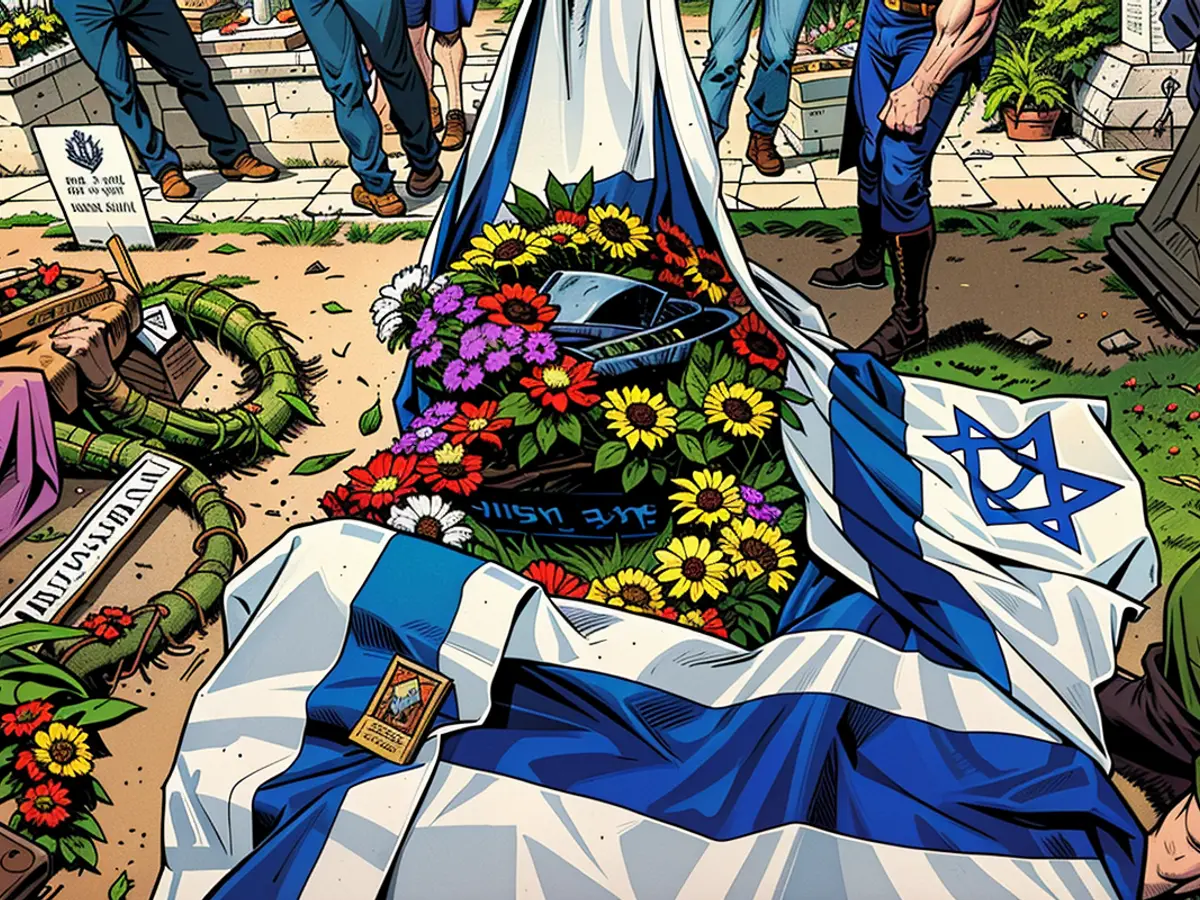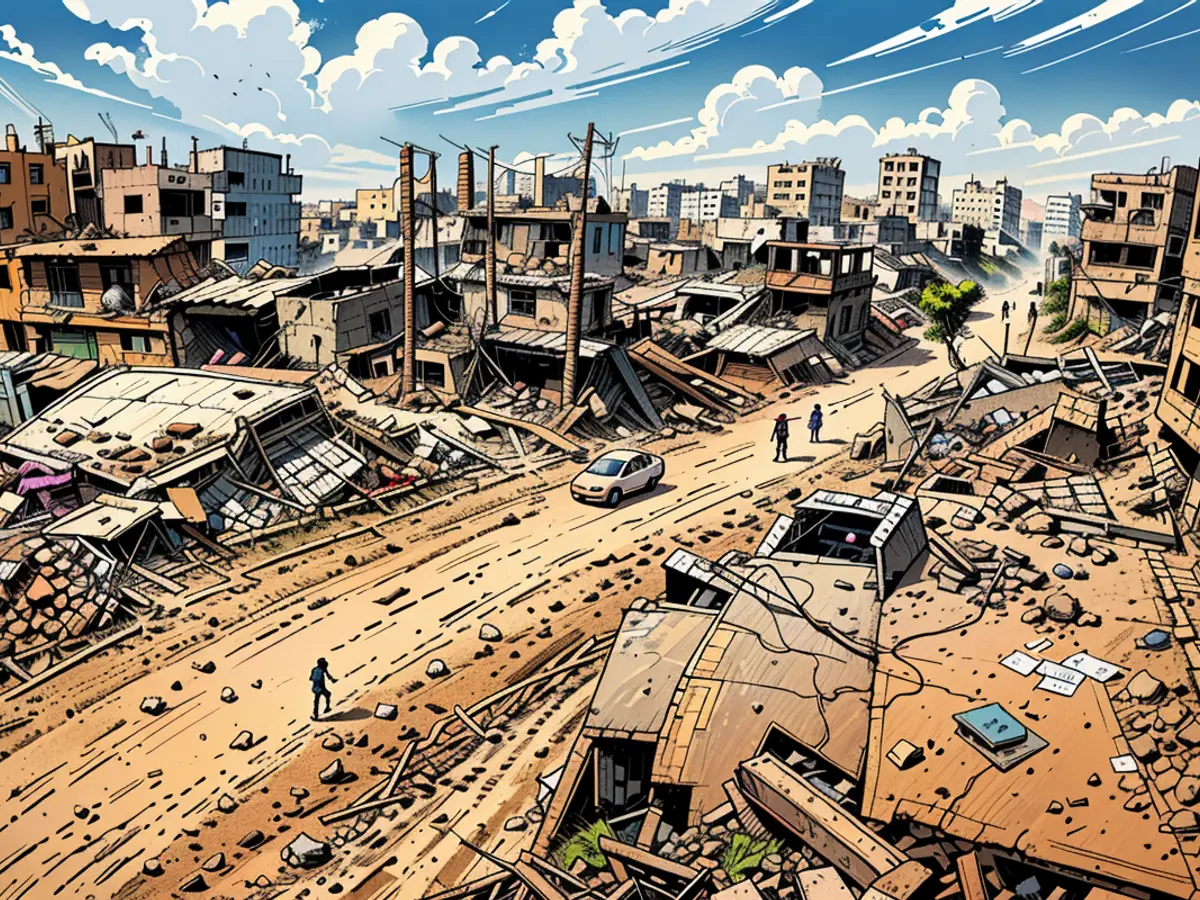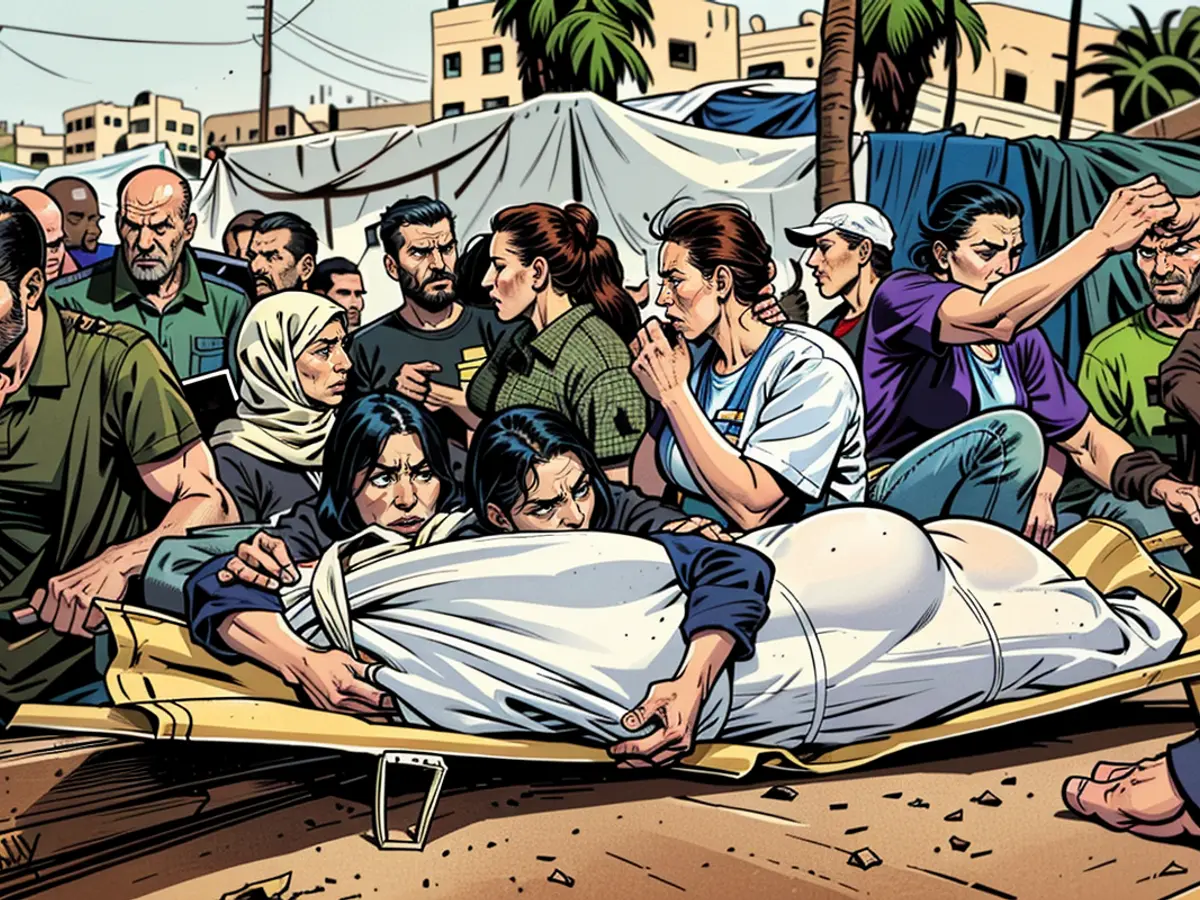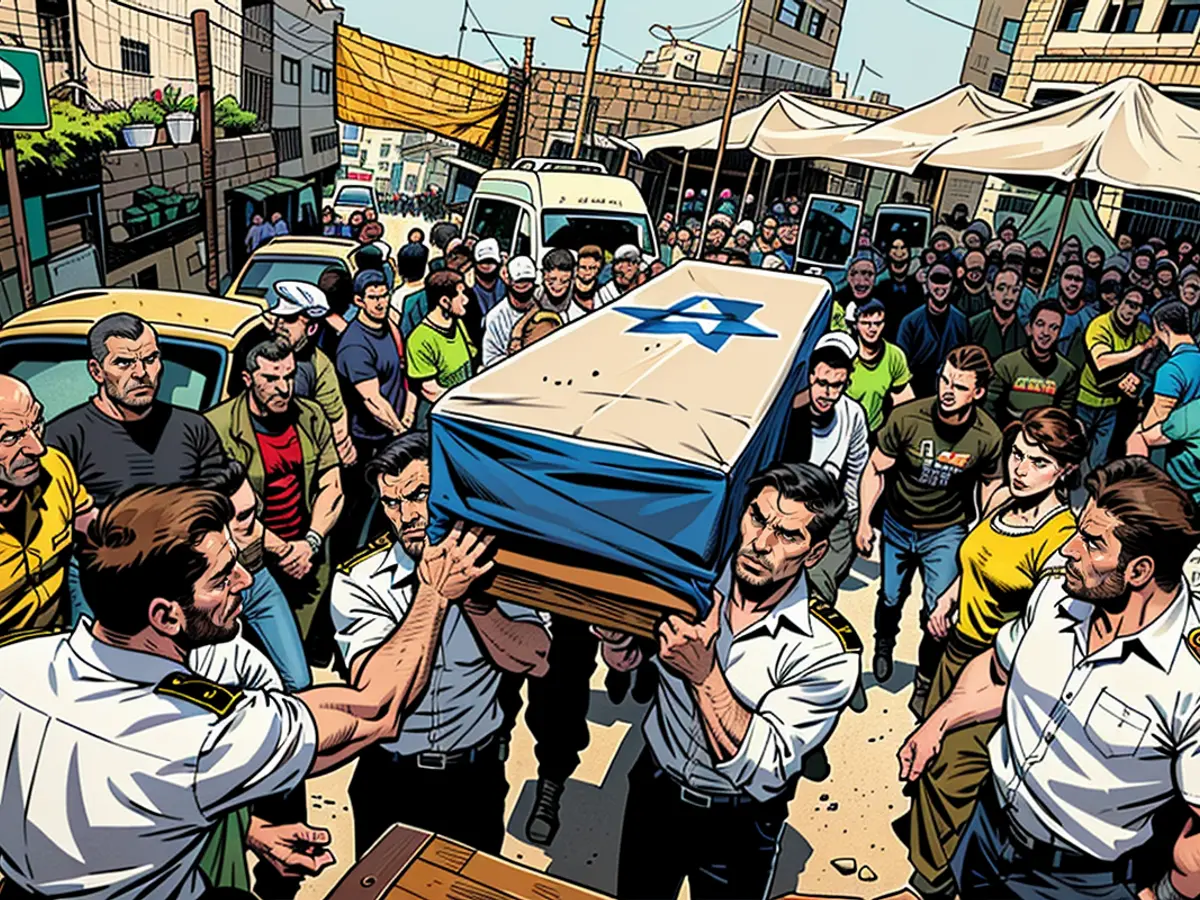"Upon leaving Gaza, the impacts of Gaza lingered within the Israeli soldiers returning from conflict, leading to mental health challenges and increased suicide rates"
A former Israeli military reservist, having returned from combat in the conflict against Hamas, emerged a changed man, scarred by the horrors he witnessed. His family shared with CNN that he battled post-traumatic stress disorder (PTSD) after his six-month deployment, leading to his tragic suicide before his scheduled redeployment. His mother, Jenny Mizrahi, remarked, "He escaped Gaza, but Gaza didn't leave him. And he died because of the trauma."
Thousands of Israeli soldiers are reportedly receiving mental health care from the military due to PTSD or other traumas suffered during the conflict. The exact number of soldiers who have taken their lives remains unaccounted for by the Israel Defense Forces (IDF).
One year post-conflict, the death toll in Gaza has surpassed 42,000, according to the strip's health ministry, with the UN reporting that most of the fatalities were women and children. The war, which followed Hamas's killing of 1,200 individuals and kidnapping of over 250, has become Israel's longest conflict since its establishment. Many soldiers are now fearful of another deployment, this time to Lebanon.
"Many of us are really scared of being drafted again for a war in Lebanon," an anonymous IDF medic mentioned during their conversation with CNN. "Many of us have lost trust in the government right now."
Israeli authorities have predominantly restricted foreign journalists from entering Gaza, making an accurate documentation of Palestinian suffering and soldier experiences challenging. Soldiers who served in Gaza shared accounts of unsettling scenes undetectable to the outside world, offering a glimpse into the severe brutality of the ongoing "eternal war," as critics call it, led by Israeli Prime Minister Benjamin Netanyahu.
The war is perceived by many soldiers as a crucial battle for Israel's survival. However, the psychological toll it has inflicted upon them is frequently buried due to societal stigma. Conversations with Israeli soldiers, a medic, and Mizrahi's family provide a peek into the mental stress impacting Israeli society continuously.
Bulldozing 'militants, alive and dead'
Mizrahi joined the Gaza operation on October 8 and was assigned to operate a D-9 bulldozer, a heavily armored vehicle equipped to handle gunfire and explosions. Before deploying, he had primarily worked in the construction industry.
Horrendous acts carried out by Hamas compelled him to join the fight, his mother explained to CNN. For 186 days, Mizrahi persisted in Gaza, enduring injuries to his knee and hearing damage after a rocket-propelled grenade strike his vehicle. He underwent treatment for his wounds and received weekly therapy, but his condition worsened.
"They didn't know how to treat them," Jenny, residing in Ma'ale Adumim settlement, West Bank, said. "They (soldiers) said the war was entirely different. They saw things that were never seen in Israel."
During his leave, he suffered from fits of rage, excessive sweating, insomnia, and social isolation, his family recalled. Speaking with his family, he emphasized that only those who experienced Gaza could comprehend his ordeal.
"He always said, no one will understand what I saw," Shir, his sister, shared.
Jenny wondered if her son may have brutally murdered someone and struggled to cope with it.
"He saw many people die. Maybe he even killed someone," she said, expressing doubt. "But we don't teach our children to do things like this. So, when he did this, it was a major shock."

Guy Zaken, Mizrahi's friend and co-driver of the bulldozer, shed some light on their ordeals in Gaza. "We faced incredibly difficult situations," Zaken informed CNN. "Things that were hard to accept."
The ex-soldier has publicly addressed the mental trauma afflicting Israeli troops in Gaza. In his testimony before Israel's Knesset, he revealed that soldiers often had to "run over militants, alive and dead, in the hundreds."
He continued, "Everything spurts out."
Zaken confesses he can no longer consume meat, as the bloody scenes he witnessed from his bulldozer in Gaza remain vivid in his memory. He also struggles to sleep at night, haunted by lingering explosive sounds.
"When you see large amounts of flesh and blood... it significantly affects you when you eat," he shared, using the word "flesh" in place of "bodies."
He maintains the majority of those he encountered were militants.
"The civilians we saw, we provided them water and allowed them to eat from our food," he recounted, sharing instances of humanitarian assistance. "However, Hamas fighters would fire upon us even during those moments."
"So, there aren't any citizens," he emphasized, speaking of Hamas's tactic of blending with civilians. "That's terrorism."
When soldiers encounter civilians, they often grapple with ethical dilemmas, the anonymous IDF medic noted.
There was a prevailing sentiment of mistrust amongst Israeli soldiers towards Palestinians in Gaza, particularly at the onset of the conflict, as revealed by a medic. This sentiment was fueled by beliefs that Gazans, including civilians, "are malicious, they support Hamas, they aid Hamas, they hide weapons," the medic mentioned.
However, this prejudice started to wane "when you truly see Gazan civilians face to face," they pointed out. The IDF claims to make every effort to prevent civilian casualties in Gaza, including by sending messages, making calls, and dropping leaflets to alert civilians prior to attacks.
Sadly, civilians in Gaza have still been massacred on numerous occasions, even when taking refuge in areas the military classifies as "safe zones." The psychological toll on Gaza's population is expected to be substantial. Various relief organizations and the UN have repeatedly flagged the catastrophic psychological repercussions of the conflict on civilians in Gaza, many of whom were already traumatized by a 17-year blockade and multiple wars with Israel. In an August report, the UN indicated that Gazans' experiences do not adhere to "traditional biomedical definitions" of PTSD, given the absence of a "post" period in Gaza's context.
Following Mizrahi's suicide, clips and photos surfaced on social media depicting him bulldozing homes and structures in Gaza while posing near vandalized sites. Some of these images, which were reportedly shared on his now deleted social media profiles, were utilized in a documentary on Channel 13 in Israel.

Mizrahi's sister, Shir, recounted observing numerous insulting comments and hateful emojis directed at her brother on social media, branding him a "murderer."
"It was difficult," she shared, adding that she made every effort to overlook these remarks. "I know he had a generous heart."
Clearing debris and the dead
Ahron Bregman, a political scientist and former Israeli army officer with six years of service, including during the 1982 Lebanon War, stated that the conflict in Gaza is unlike any other fought by Israel.
"It's protracted," he observed, and urban, which means soldiers engage in combat amidst numerous civilians, "the vast majority of whom are innocents."
Bulldozer operators, who are directly exposed to the conflict's brutality, are among those who deal with the aftermath most directly, Bregman explained. "They encounter dead people and debris together," he shared with CNN. "They move over them."
Transforming back to civilian life can be daunting for many, particularly after urban warfare involving deaths of women and children, Bregman stated.
"How can you put your children to bed knowing that you have witnessed children being killed in Gaza?"
Despite Mizrahi's mental health issues, his family confirmed his agreement to return to Gaza when summoned again. Two days before his scheduled redeployment, he took his own life.
In her home, Jenny has dedicated a room as a memorial to her late son, featuring childhood photos and construction work artifacts. One of the items she has saved is Mizrahi's hat, which shows visible bullet holes from his self-inflicted gunshot wound.
Mizrahi's family began speaking out about his death after the IDF refused him a military funeral, citing his lack of "active reserve duty." They eventually retracted this decision.
Haaretz reported that 10 soldiers committed suicide between October 7 and May 11, according to military data obtained by the newspaper.
Regarding the number of suicides in the IDF since the war, Uzi Bechor, a psychologist and head of the IDF's Combat Response Unit, disclosed that the medical corps cannot supply a figure and maintains that the suicide rate remains stable.

"The suicide rate in the army has remained more or less consistent in the last five or six years," Bechor stated, indicating that it has actually decreased over the past decade.
Even if the suicide rate is higher, he admitted, the ratio is unchanged since the previous year due to the increased number of soldiers.
"There is no evidence of an upward trend in suicides," Bechor informed CNN.
He did not disclose the number of suicides or their rate. "Every individual case is heartbreaking for us," he stated.
Still, approximately one-third of soldiers disqualified from combat are diagnosed with mental health issues, the Israeli defense ministry's rehabilitation division reported in August. Each month, approximately 1,000 new wounded soldiers are removed from combat for treatment, with 35% citing mental health concerns and 27% developing PTSD.
By the end of the year, it is estimated that 14,000 wounded soldiers will seek treatment, with approximately 40% expected to suffer from mental health issues.
Seeking assistance
Resources are available for those struggling with suicidal thoughts or mental health concerns. In the US: Contact or text 988, the Suicide & Crisis Lifeline.
Globally: Contact the International Association for Suicide Prevention and Befrienders Worldwide for crisis center information.
More than 500 people die by suicide annually in Israel and over 6,000 attempt suicide each year, according to Israel's Ministry of Health, which acknowledges approximately 23% underreporting in the reported figures.
In 2021, self-inflicted deaths surpassed all other causes of demise among Israeli Defense Forces (IDF) personnel, as reported by The Times of Israel, citing military statistics indicating at least 11 soldiers had ended their lives that year.
Initially, the Ministry of Health attempted to dismiss rumors of an elevated suicide rate since October 7, declaring that the reported incidents were merely isolated media and social media occurrences. Without furnishing any numerical data, the ministry asserted that there had been a decrease in suicide occurrences in Israel from October to December, in comparison to the same period in previous years.
Bregman, a war veteran who served in Lebanon, acknowledged the reduced stigma surrounding PTSD and other mental health concerns in contemporary times. Nevertheless, he emphasized that those who had served in Gaza would continue to grapple with the repercussions of their experiences throughout their lives.

An IDF medic who spoke to CNN revealed that a mental health officer was designated to each armed force unit, both during and following deployment. Despite this, the medic acknowledged the enduring effects of the conflict, with soldiers as young as 18 showing signs of mental distress in Gaza. These individuals were frequently observed weeping or exhibiting an emotionless demeanor.
Normalizing the extraordinary
Bechor, an IDF psychologist, explained that one method through which the military aids traumatized troops in resuming their lives was by trying to "normalize" their experiences, including reminding them of the horrors that unfolded on October 7.
"This situation is not ordinary for human beings," Bechor acknowledged, adding that when soldiers returned from active duty with PTSD symptoms, they frequently met questions such as: "How do I resume my life after what I witnessed? How can I interact with my children after what I witnessed?"
"We try to normalize it and to help them remember their values and understand why they were there (in Gaza)," he told CNN.
Approximately 100,000 Israelis had volunteered or been drafted to participate in the Gaza conflict, viewing it both as an act of self-defense and an existential struggle. This notion was propounded by prominent Israeli political and military leaders, as well as by Israel's international allies.
Netanyahu has characterized Hamas as "the new Nazis," while Biden has stated that the "ancient hate directed at Jews" endorsed by the Nazis "was rekindled" on October 7.
The threats confronting their nation served to unify a substantial number of Israelis, putting aside domestic political disagreements that had previously fractured society. During this time, the pain of Palestinians barely registered on Israeli television screens, with the media largely focusing on the hostages held captive in Gaza.
A survey published by the Israel Democracy Institute revealed a year after the October 7 attack that only 6% of Israelis believed the Gaza conflict should be terminated due to the high human toll it had inflicted.
Some soldiers, however, were unable to reconcile the atrocities they had witnessed.
Upon returning from Gaza, Mizrahi frequently shared with his family his feeling of "invisible blood" coursing through his veins, his mother recounted.
Shir, his sister, attributed her brother's demise to the military and the Gaza conflict. "Because of the army, because of this war, my brother is no longer among us," she said. "Maybe he didn't perish from enemy gunfire or an RPG, but he was consumed by an intangible bullet," she added, alluding to her brother's psychological anguish.
What constitutes Post-traumatic stress disorder (PTSD)? According to the UK's National Health Service, PTSD is a mental health ailment triggered by extraordinarily distressing or terrifying events. Individuals afflicted with PTSD often relive the traumatic event via nightmares and flashbacks, and may exhibit feelings of detachment, irritability, and guilt. PTSD can manifest immediately following an alarming incident or develop weeks, months, or even years later.

The war in Gaza has had a significant impact on Israeli soldiers, with many battling PTSD due to their experiences. Many soldiers are now fearful of being deployed to Lebanon, citing their fear and mistrust of the government and their own mental traumas.
In Gaza, the bulldozer operators, like Mizrahi, who were directly exposed to the conflict's brutality, often encountered dead people and debris while clearing the area. Those who have returned from Gaza have found it challenging to resume their civilian lives, especially after witnessing the deaths of women and children.







